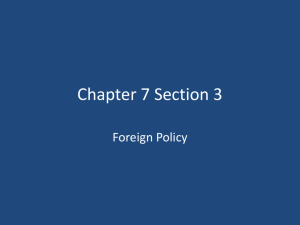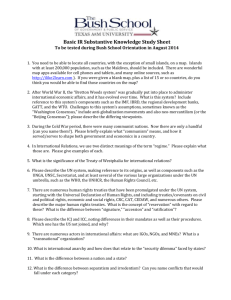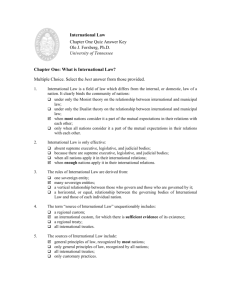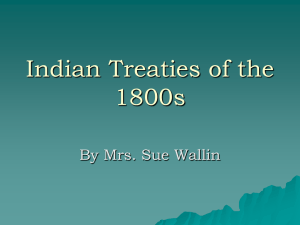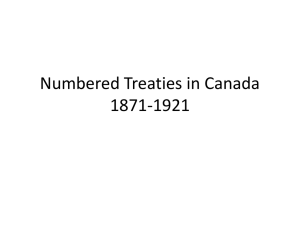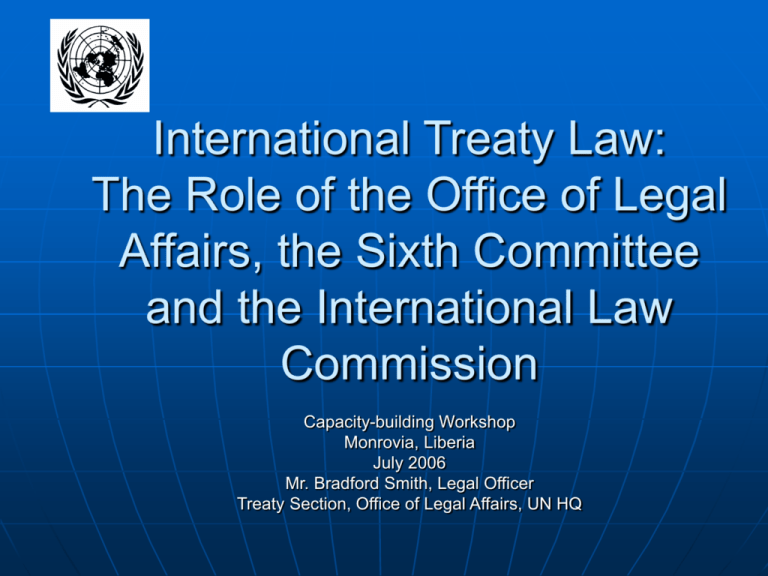
International Treaty Law:
The Role of the Office of Legal
Affairs, the Sixth Committee
and the International Law
Commission
Capacity-building Workshop
Monrovia, Liberia
July 2006
Mr. Bradford Smith, Legal Officer
Treaty Section, Office of Legal Affairs, UN HQ
Overview
Brief Overview of Office of Legal
Affairs
Contributions of the Treaty
Section
Sixth Committee
International Law Commission
LOUIS HENKIN
“Every nation derives some benefits from
international agreements. Law keeps
international society running, contributes to
order and stability, provides a basis and a
framework for common enterprise and mutual
intercourse. Because it limits the actions of
other governments, law enhances each nation’s
independence and security; in other ways, too,
by general law or particular agreement, one
nation gets others to behave as it desires.”
United Nations
Office of Legal Affairs
Office of the Legal Counsel (OLC)
General Legal Division (GLD)
Codification Division (COD)
Division for Ocean Affairs and the
Law of the Sea (DOALOS)
International Trade Law Division
(ITLD)
Treaty Section (TREATY)
Office of the Legal Counsel (OLC)
OLC assists the Legal Counsel in the overall
management of OLA and in the coordination of
legal advice and services to the UN as a whole.
Prepares legal opinions on interpretation of
Charter, interpretation and drafting of rules of
international public law, UN resolutions and
regulations.
Prepares agreements and legal instruments
regulating relations of UN with Member States,
intergovernmental organizations, NGOs and other
legal entities.
Handles legal aspects relating to peacekeeping
and other UN operations.
Prepares draft rules of procedure and advises UN
organs and conferences on the conduct of
business.
General Legal Division (GLD)
Prepares legal opinions and advice on the
administrative law of the UN, on international
private law and on UN resolutions and regulations
relating to such matters.
Provides legal advice to UN programmes and
funds in connection with operational activities in
economic and social fields.
Provides legal advice on procurement, the
drafting and negotiating of contracts and other
commercial matters.
Provides legal advice on legislative and
operational arrangements governing staffing,
supply and provisioning of peacekeeping,
observer and humanitarian missions.
Codification Division (COD)
Assists and provide secretariat and legal
research services to the Sixth Committee
of the GA, the International Law
Commission (ILC) and other organs of the
UN, including diplomatic conferences, in
the codification and development of
international law.
Prepares analytical papers, background
studies and drafts of international
conventions.
Prepares publications and disseminates
information on international law.
International Trade Law Division
(ITLD)
Provides secretariat and legal research
services to UN Commission on
International Trade Law (UNCITRAL).
Assists UN organs, bodies and conferences
in matters relating to international trade
law.
Collects and disseminates information on
international trade law.
Provides training and assistance and
supports technical cooperation activities.
Division for Ocean Affairs and the
Law of the Sea (DOALOS)
Provides legal and technical services to
States and international organizations
relating to UNCLOS and related treaties.
Services the GA on law of the sea issues,
the Meeting of the States Parties to the
Convention and Commission on Limits of
Continental Shelf.
Provides training and technical assistance.
The Treaty Section
• Responsible for the registration and
publication of treaties under Article 102
of the Charter.
• Discharges the depositary functions of
the S-G.
• Provides advice and information on
treaty law and the depositary practice of
the S-G.
• Collaborates on the drafting of final
clauses of treaties concluded under the
auspices of the UN.
• Provides training.
The S-G’s Thoughts
The Secretary-General (S-G) observed in 2000:
• "The expansion of the rule of law in
international relations has been the foundation
of much of the political, social and economic
progress achieved in recent years.
Undoubtedly, it will facilitate further progress
in the new millennium.”
• "The new millennium is an appropriate
occasion to reaffirm the primary objectives of
our Organization and focus on them anew.
Establishing the rule of law in international
affairs is a central priority.”
Registration
Treaty Section mandates:
• Article 102 of UN Charter requires all Member
States to register their treaties and agreements
after their entry into force
• This is a mandatory obligation;
• Treaty Section receives analyzes, processes,
registers and records treaties and publishes the
Monthly Statement of Treaties in hard copy and on
the Internet;
• Contributes towards transparency in international
relations;
• Treaty Section registers approximately 4000
treaties and related actions annually (ratifications,
declarations, reservations, territorial extensions,
etc.).
Increase in Registration
There are a number of reasons for this:
• New Countries which have joined the
international community recently
have been enthusiastic about
concluding treaties;
• Increase in international law-making
in the last 15 years;
• Certain special international
developments;
• Increasing awareness of the need to
register treaties.
Publication
All registered treaties must be published
in United Nations Treaty Series (UNTS);
The mandate to publish all registered
treaties is found in Article 102 of the
Charter;
The UNTS has been published
continuously since 1946:
• It contains over 50,000 treaties, and a similar
number of related actions;
• There are over 2,200 printed volumes, in 142+
languages, and over 1,000,000 pages.
All published volumes are available on the
Internet at http:untreaty.un.org;
Objectives of Publication
Encourages the dissemination of
international law;
Removes mystique surrounding
treaties;
Encourages the participation of civil
society.
Justice Sandra Day O’Connor said:
“International law stemming from these various
sources is at last a concern for the lawyer
counseling her client on issues ranging from
commerce, to the environment to family law, to
human rights, to immigration, to intellectual
property. International law is no longer an issue
only for diplomats and trade lawyers. With
increasing globalization, international law affects
business and litigation decisions across the
board. And lawyers, in their role as counselors,
must recognize potential international law issues
even when they show up in unexpected
contexts.”
Depositary Functions
Treaty Section discharges the functions of the
S-G as Depositary of over 500 multilateral
treaties:
S-G not obligated to accept role but usually will
for:
• Open multilateral treaties of a universal
nature;
• Treaties adopted by the General Assembly;
• Treaties concluded by a conference
convened by a UN organ;
• Regional treaties drawn up within the
framework of the regional commissions.
S-G’s Role as Depositary
The S-G is responsible for preparing the originals of
treaties and the certified true copies thereof;
The S-G is responsible for ensuring the proper execution
of all treaty actions relating to a treaty (e.g., signature,
ratification, accession, etc.) and is guided by:
• Article 77 of the VCLT 1969;
• Provisions of the relevant treaty (final clauses);
• His practice which pre-dates the VCLT and has evolved
since (Summary of Practice);
• Resolutions of the GA and other UN organs;
• Customary international law.
The S-G provides advice and assistance relating to the
conclusion of treaties, particularly their final clauses;
The S-G also provides advice and information on international
treaty law, the depositary practice of the S-G, and provides
interpretations of final clauses.
Treaty Events
“Encouraging Wider Participation”
In 2000, the Millennium Year, a campaign
was launched to encourage wider
participation in the multilateral treaties
deposited with the S-G:
The Millennium Summit Treaty Event:
• Very successful - 274 treaty actions by 84
States, mostly by heads of State and
Government.
• S-G decided to hold such an event each year.
Treaty Events
Since then:
Focus 2001 - Rights of Women and
Children;
Focus 2002 - Sustainable Development
Focus 2003 - Treaties Against
Transnational Organized Crime and
Terrorism;
Focus 2004 – Protection of Civilians;
Focus 2005 – Responding to Global
Challenges (Liberia undertook 83 treaty
actions).
Trainings and Technical Assistance
Assistance provided to countries to become party
to treaties consistent with the SG’s commitment
(signature, ratification/accession, etc.).
TS published Treaty Handbook to assist States in
registering treaties and becoming party (available
in all UN official languages);
Handbook on Final Clauses is also available in all
UN official languages;
These Handbooks are supplemented with training
sessions for legal officers assisting governments
and others:
• Annual trainings are conducted at UN HQ in Spring and
Fall;
• Regional trainings (Laos, ASEAN, CARICOM, Vietnam,
Geneva, Hague, North Korea and now Liberia);
Publications on the Internet
(http://untreaty.un.org)
Multilateral Treaties Deposited with the
Secretary-General
United Nations Treaty Series
League of Nations Treaty Series
Depositary Notifications (CNs)
Certified True Copies of treaties deposited
with S-G
Summary of Practice of the Secretary-General as
Depositary
Treaty Handbook
Handbook of Final Clauses
Monthly Statement of Treaties and International
Agreements
UNTC on Internet received over 2 million hits in
April and May.
Sixth Committee
(Legal)
One of the Main Committees of the
GA;
All UN Members have right to be
represented;
Elects its own officers;
Decisions are made by a majority of
the members present and voting, a
majority of the committee
constituting a quorum.
Sixth Committee
Agenda Items
Current agenda items include, for
example:
• UN Programme of Assistance in the Teaching,
Study, Dissemination and Wider Appreciation
of International Law;
• Report of the UN Commission on International
Trade Law on the work of its thirty-eighth
session;
• Measures to eliminate international terrorism;
• Scope of legal protection under the Convention
on the Safety of UN and Associated Personnel;
• Report of the International Law Commission on
the work of its fifty-seventh session.
Sixth Committee
Considers agenda items referred by the GA;
Adopts its own priorities and establishes a
programme of work;
Meets as necessary and establishes Working
Groups;
Working Groups report to the Committee;
Committee may then prepare recommendations
and draft resolutions for submission to GA:
• To continue to elaborate a particular convention;
• To continue its efforts to resolve outstanding issues;
• To adopt a particular draft treaty.
Recent treaties adopted by Sixth
Committee/General Assembly
Convention on Safety of UN and Associated
Personnel, 1994;
Convention on the Law of Non-Navigational Uses
of International Watercourses, 1997;
International Convention for the Suppression of
Terrorist Bombings, 1997;
International Convention for the Suppression of
the Financing of Terrorism, 1999;
UN Convention on the Jurisdictional Immunities
of States and Their Property, 2005;
International Convention for the Suppression of
Acts of Nuclear Terrorism, 2005.
International Law Commission
Background
Established by the GA in 1947;
Promotes the progressive development of
international law and its codification;
34 members elected by GA for five year terms;
Meets annually;
Members serve in individual capacity (not as
representatives of their Governments);
Members must have recognized competence in
international law;
Commission members represent the principal
world legal systems (geographic representation
ensured);
Professor Alain Pellet, Special Rapporteur
International Law Commission
Article 13(1) of UN Charter
Governments drafting the UN Charter were
opposed to conferring on the UN legislative power
to enact binding rules of international law;
However, strong support for conferring on the GA
the more limited powers of study and
recommendation, which led to the adoption of
article 13(1) of the Charter:
• The General Assembly shall initiate studies and make
recommendations for the purpose of: a) …encouraging
the progressive development of international law and its
codification.
• To discharge its responsibility under article 13, the GA
established the ILC.
International Law Commission
Programme of Work
Programme of work adopted in 1949
(14 topics) continues to constitute
the ILC’s basic long-term programme
of work;
Since 1949, the ILC has submitted
final drafts or reports with respect to
10 of these topics;
Numerous topics referred to ILC by
GA over the years.
Items considered at 60th Session
Shared natural resources
Effects of armed conflicts on treaties
Responsibility of international organizations
Diplomatic protection
Expulsion of aliens
Unilateral acts of States
Reservations to treaties
Fragmentation of international law
International liability in case of loss from
transboundary harm arising out of hazardous
activities
International Law Commission
Role of Governments
Governments play an important role at every
stage of the ILC’s programme of work by:
• Providing information to ILC on items included in the
plan of work,
• Commenting on documents containing drafts, supporting
materials and information supplied by Governments,
which are taken into consideration by ILC in its final
drafts,
• Comments made during the annual debates of the Sixth
Committee on the ILC’s report to the GA are also taken
into consideration
• After the ILC has submitted its final draft to the GA on a
topic, the GA normally requests comments of
Governments on the draft. Such comments are then
considered by the Sixth Committee.
International Law Commission
Relationship with Sixth Committee
ILC submits to the GA a report on the work done
at each session;
Sixth Committee annually considers the ILC’s
reports;
GA, usually on the recommendation of Sixth
Committee, has:
• Requested ILC to study a number of topics or to give
priority to certain topics;
• Rejected or deferred action in respect of certain drafts
and recommendations of the ILC;
• Decided to convoke diplomatic conferences to study and
adopt draft conventions prepared by ILC, and;
• Decided to consider and adopt draft conventions
prepared by the ILC.
International Law Commission
Relationship with Other Bodies
ILC also maintains close relationships with
other bodies, including:
• Principal organs of UN other than the GA;
• Specialized Agencies;
• Official bodies established by
intergovernmental agreement (Pan American
Union);
• Inter-American Juridical Committee;
• Asian-African Legal Consultative Committee;
• European Community on Legal Cooperation;
and
• Arab Commission on International Law.
Since 1949 the ILC has submitted
final drafts/reports on:
Regime of High Seas
Regime of Territorial Waters
Nationality, including statelessness
Law of treaties
Diplomatic relations and immunities
Consular relations and immunities
Arbitral procedure
Succession of States in respect of treaties
Succession of States in respect of matters other
than treaties
Jurisdictional immunities of States and their
property
ILC Reports Resulting in Key
Treaties
Rome Statute of International Criminal
Court, 1998
Vienna Convention on Diplomatic
Relations, 1961
Vienna Convention on the Law of Treaties,
1969
Convention on the Prevention and
Punishment of Crimes against
Internationally Protected Persons,
including Diplomatic Agents, 1973
Copyright Notice
Copyright 2004 by the United Nations. All
rights reserved. Printed in the United
States of America. No part of this
publication may be reproduced, stored in
a retrieval system, or transmitted in any
form by any means, i.e., electronic,
mechanical, photocopying, recording, or
otherwise, without the written permission
of the United Nations.

